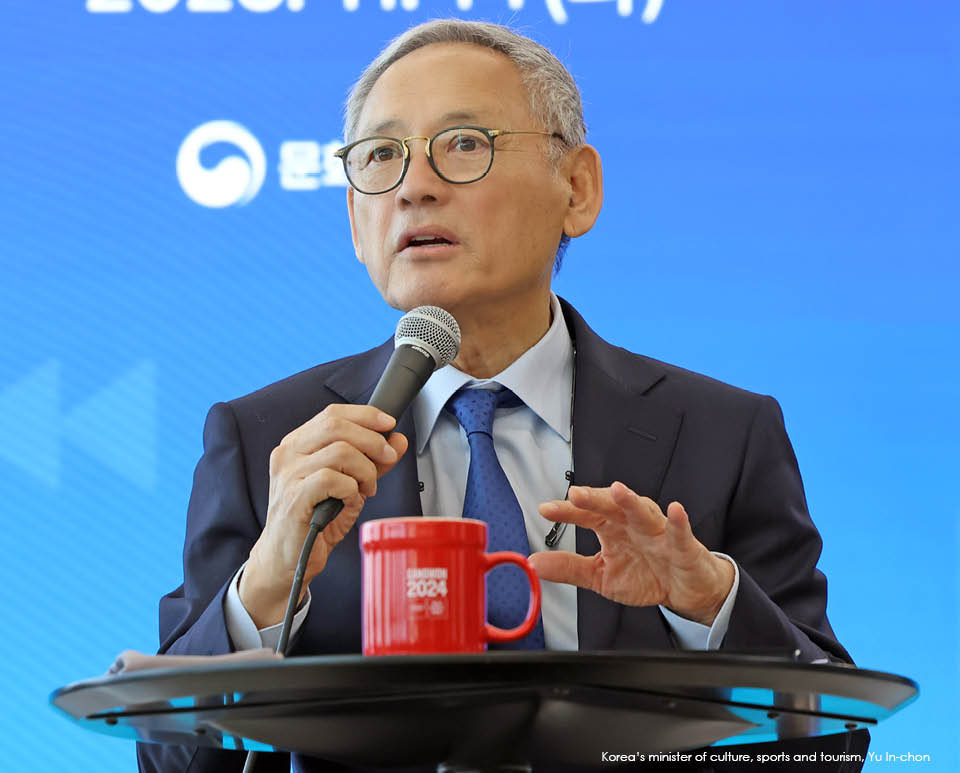
Korean authorities have begun laying plans to expand the country’s content industry to KRW 40 trillion/US$31 billion by 2027 – a 42.8% increase from KRW 28 trillion/US$21.7 million in 2022 – as part of a new “Video Industry Leap Forward Strategy”.
The measures are grounded in a determination to protect the domestic industry, and indicate a keen eye is being kept on global streaming services in Korea.
The strategy, unveiled this month by the Minister of Culture, Sports and Tourism, includes a five-year KRW 1 trillion/US$776 million fund, that will be raised from multiple government agencies and private investment, to boost premium video content.
The K-Content Strategy Fund, which kicks off with in 2024 with KRW 600 billion/US$465 million, will run to 2028.
Hopes are that the “killer content” initiatives will boost exports to US$1.8 billion by 2027 and produce at least a handful of global awards, including the Oscars.
On the agenda too are the expansion of tax credits for content production costs, and the possibility of tax deductions for streaming subscription payments, which will be considered “cultural expenses”.
The government’s move follows the outsize global popularity of Korean hits, including new series "Daily Dose of Sunshine" and "Castaway Diva" on Netflix, and increased attention being paid to rights arrangements between streamers and domestic producers.
“Global online video services monopolise excess profits by transferring intellectual property when investing in domestic content production, and there are many phenomena in which domestic production companies are unable to generate profits through secondary works,” the ministry said.
“In addition, problems are being raised that creators such as directors do not receive fair compensation after transferring all rights,” it added.
Hopes are that the latest initiative – including funding for projects where producers retain rights and strengthening anti-copyright measures – will give the domestic production industry the ability to benefit more than t...
Korean authorities have begun laying plans to expand the country’s content industry to KRW 40 trillion/US$31 billion by 2027 – a 42.8% increase from KRW 28 trillion/US$21.7 million in 2022 – as part of a new “Video Industry Leap Forward Strategy”.
The measures are grounded in a determination to protect the domestic industry, and indicate a keen eye is being kept on global streaming services in Korea.
The strategy, unveiled this month by the Minister of Culture, Sports and Tourism, includes a five-year KRW 1 trillion/US$776 million fund, that will be raised from multiple government agencies and private investment, to boost premium video content.
The K-Content Strategy Fund, which kicks off with in 2024 with KRW 600 billion/US$465 million, will run to 2028.
Hopes are that the “killer content” initiatives will boost exports to US$1.8 billion by 2027 and produce at least a handful of global awards, including the Oscars.
On the agenda too are the expansion of tax credits for content production costs, and the possibility of tax deductions for streaming subscription payments, which will be considered “cultural expenses”.
The government’s move follows the outsize global popularity of Korean hits, including new series "Daily Dose of Sunshine" and "Castaway Diva" on Netflix, and increased attention being paid to rights arrangements between streamers and domestic producers.
“Global online video services monopolise excess profits by transferring intellectual property when investing in domestic content production, and there are many phenomena in which domestic production companies are unable to generate profits through secondary works,” the ministry said.
“In addition, problems are being raised that creators such as directors do not receive fair compensation after transferring all rights,” it added.
Hopes are that the latest initiative – including funding for projects where producers retain rights and strengthening anti-copyright measures – will give the domestic production industry the ability to benefit more than they are from the success of Korean content.
Newly appointed Minister Yu In-chon, who has held the position since September, said the plan aimed to support the industry and respond to change.
The ministry used phrases such as “create favorable conditions” in its description of their aims.
The minister said the plan was developed in consultation with local producers and platforms, and includes measures to boost the domestic movie/theatrical industry.
“Unlike the rapid progress of global online video services (OTT), as domestic online video services and broadcasting companies are facing worsening management difficulties, production companies are also experiencing difficulties,” the ministry said.
From Jan to Sept 2023, movie theater sales (KRW 956.5 billion/US$741 million) were only 70% of the average for the same period in 2017 to 2019.
Describing Korea’s film industry as in a “serious recession,” the ministry said about 50 films were still waiting for release.
“This policy announcement was prepared to further strengthen the competitiveness of K-video content and lead the global market in response to the current situation where the dominance of global online video services (OTT) is growing and the importance of intellectual property (IP) is increasing,” the ministry said.
Data presented during the announcement showed the global online video service market had grown at an average annual rate of 25% between 2018 and 2022. Export volume of Korean content had increased from $550 million in 2017 to $920 million in 2021.




















